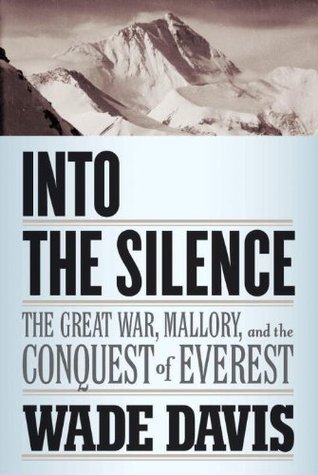AudioBook Review: Into the Silence, by Wade Davis

Title: Into the Silence: The Great War, Mallory, and the Conquest of Everest
Author: Wade Davis, read by Enn Reitel
Publication Info: Random House Audio, 2011, 29 hours. Original hardback, Knopf Canada, 2011, 672 pages.
Source: Library (Overdrive)
Publisher's Blurb:
If the quest for Mount Everest began as a grand
imperial gesture, as redemption for an empire of explorers that had lost
the race to the Poles, it ended as a mission of regeneration for a
country and a people bled white by war. Of the twenty-six British
climbers who, on three expeditions (1921-24), walked 400 miles off the
map to find and assault the highest mountain on Earth, twenty had seen
the worst of the fighting. Six had been severely wounded, two others
nearly died of disease at the Front, one was hospitalized twice with
shell shock. Three as army surgeons dealt for the duration with the
agonies of the dying. Two lost brothers, killed in action. All had
endured the slaughter, the coughing of the guns, the bones and barbed
wire, the white faces of the dead.
In a monumental work of
history and adventure, ten years in the writing, Wade Davis asks not
whether George Mallory was the first to reach the summit of Everest, but
rather why he kept on climbing on that fateful day. His answer lies in a
single phrase uttered by one of the survivors as they retreated from
the mountain: "The price of life is death." Mallory walked on because
for him, as for all of his generation, death was but "a frail barrier
that men crossed, smiling and gallant, every day." As climbers they
accepted a degree of risk unimaginable before the war. They were not
cavalier, but death was no stranger. They had seen so much of it that it
had no hold on them. What mattered was how one lived, the moments of
being alive.
For all of them Everest had become an exalted radiance, a sentinel in the sky, a symbol of hope in a world gone mad.
My Review:
Where to start? This was such a huge book, and so many hours of listening (and no, I didn't notice that before I started!) that it's hard to know. First, though at times I felt further editing might have been in order, the fact that I finished is testimony to the book being generally well done. The narrator for the audio book was pretty good, though by the end certain vocal ticks wore on me (especially small pauses in places that didn't make sense to me, which may have been indicating quotations but sometimes seemed purely random).
Okay, but what about the story? Well, this combined a couple of my interests, so I was pretty much sold from the beginning. The blurb explains why the author felt it necessary to spend so much of a narrative about climbing Everest in describing the war experiences of the men who did it, though with so many players I couldn't always keep track. Reading an actual paper copy of this book is probably the way to go, aside from the strain of lifting a nearly 700-page tome. But the author's thesis, which argues that the war in effect made death so commonplace to these men that risking their lives on the mountain didn't bother them, is intriguing. If so, then WWI has left an imprint on mountaineering to this day, as a certain amount of that attitude remains among those who are doing the modern equivalent of these early climbs, pushing the limits of what we might think a human can do and accepting the risk of death.
When the blurb calls the climbs 'assaults' that is spot on. British exploration of the period was definitely a matter of conquest and domination (and the author provides some historical background on their relations with Tibet and India that goes along with this approach). The same attitude of British superiority that in many cases killed a lot of soldiers during the war also led to exploitative and dismissive treatment of the local peoples with whom the climbers dealt.
Ultimately, what stuck with me was the toughness of the men of those early expeditions. Their equipment was pathetic by modern standards, their clothing wholly inadequate, and their knowledge of the terrain and the climate virtually non-existent (in part that's their own fault, of course. The local people had no desire to climb the mountain, but they certainly understood the weather. No one appears to have asked them). What they mostly had going for them was the willingness to push on to and beyond the point of death. Did that take Mallory and Irvine to the summit? We will probably never know, and in the end it doesn't seem to matter.
My Recommendation:
If you are interested in the early history of mountaineering in the Himalaya, this is a must-read. It does help to have an interest in WWI as well, since the first 4 or 5 hours of the book talk about the war, with some flashbacks later as new people are introduced in the various expeditions. I'm pretty sure the print book has photos and maps that I would very much like to see--this is not a great choice for an audio book, due to that, to length, and to complexity.

Comments
Post a Comment
Let us know what you think! We love to hear from our readers!